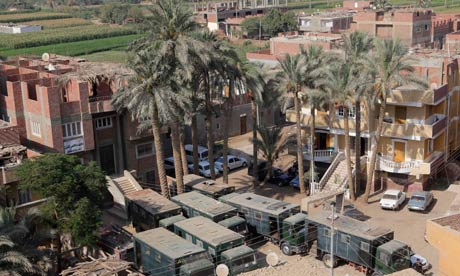
Egypt has a chronic sectarian problem, and the main obstacle to addressing it is official and popular denial that it has one.
Following each sectarian conflagration the government in Cairo issues its customary denials and denunciations and sends a delegation of officials and elders to reconcile the Muslim and Coptic sides.
It's a well-known routine that has with time become increasingly absurd and out of touch with reality. The problem has been known for some time and acknowledged by all sensible people in Egypt, but apart from the rhetoric, no concrete steps have been taken to defuse it.
Egypt should apply the law to everyone and stop treating sectarian violence as a minor fight between brothers that is best kept within the family.
Last week's flare-up was classic: a banal dispute between a Christian laundryman and a Muslim customer plunged the entire village of Dahshour, south of Cairo, into a perilous sectarian conflict culminating in the Copts abandoning their homes and businesses in the village.
As one Muslim was killed accidentally in the brawl that followed the altercation with the Christian laundryman, fellow Muslims went on the rampage plundering Christian shops and torching homes.
Locals accuse the police of standing by and of failing to act in time, despite warnings of revenge attacks. Human rights groups had also urged the police to be prepared for the worst, but their warnings fell on deaf ears.
As has been noted many times before, the practice of "informal reconciliation" instead of applying the penal code on what is fundamentally a criminal act, has only made matters worse by sending the wrong signal.
The Egyptian leadership's handling of the crisis shows that it has learned little from past mistakes.
Instead of rushing to the village to inspect the damage and reassure Christians there, President Mohamed Morsi did more or less what the now jailed former president Hosni Mubarak used to do: he denounced the violence and urged the authorities to punish the culprits. Bizarrely, his office later released a statement saying the presidency had received assurances that the Copts were not forced out of their homes, but simply fled out of fear for their own safety.
Given his Islamist ideology, which is often blamed for sectarian attacks on Christians in Egypt and elsewhere in the region, and that he is the country's first democratically elected president, Morsi could have used the Dahshour incident to convince Egypt's sizeable Christian minority (who are justifiably fearful of him) that his brand of Islamism embraces in deeds, and not just in words, the secular values of equal rights to citizens regardless of gender and religion. But he clearly missed that opportunity.
The Copts have heard the Islamist mantra far too often – that Allah has obliged Muslims to protect "the people of the book". As Islamists assume power in Egypt, the sectarian violence in Dahshour offered them an opportunity to prove their critics wrong. But Morsi's behaviour has so far failed to reassure his Coptic subjects.
Egypt's sectarian malaise runs deeper than many might imagine. Those who think it is confined to rural Egypt and poor communities should abandon that illusion. I was shocked to hear abominable views of Copts among Egypt's affluent and supposedly well-educated Muslims: "They want to take over the country", "They should be kept in their place," etc. A Muslim architect once told me: "Guns are the only language they understand." Not to mention, of course, talk of "monasteries being turned into fortresses and weapons depots".
Such views are hardly surprising given the official attitudes. The authorities never acted against public events or the TV talk shows that denigrate Christianity and present it as an inferior religion . The logical conclusion is that they seem to condone what amounts to incitement to hatred of Copts.
The Egyptian state has never accepted the obvious: the Copts – estimated to be 10% of the population – suffer discrimination. Not only are Copts hard to find in senior government and military and security posts, but their right to worship is seriously undermined. While Muslims can build mosques anywhere they like – even illegally, and the state never dares to knock them down – Copts face often-insurmountable bureaucratic hurdles to obtain planning permission, not just for new churches, but even to renovate existing ones.
The Copts don't like to describe what happened in Dahshour or elsewhere many times before as "clashes". They describe each such sectarian incident as an "attack" on them, and rightly so.
But they too bear part of the responsibility for their ordeal. The more they take refuge in their own religious institutions the more they walk into the sectarian trap. Relatively few are active in public life. The deeply conservative Coptic church, which has resisted social change as much as its Islamic counterparts, has sought to speak on behalf of Christians – which tends only to aggravate Egypt's sectarian wounds.
Religious solidarity along sectarian lines is part of the problem, and certainly not the solution. While it is understandable that the church has to defend the interests of its followers, the response to the dangers of politicised Islam should not be politicised Christianity.
The interests of Copts are best served by defending the separation of religion from politics and not by turning the church into a political platform.



